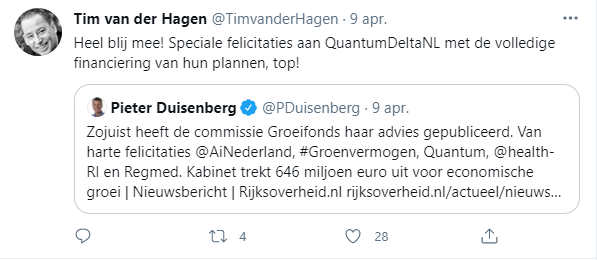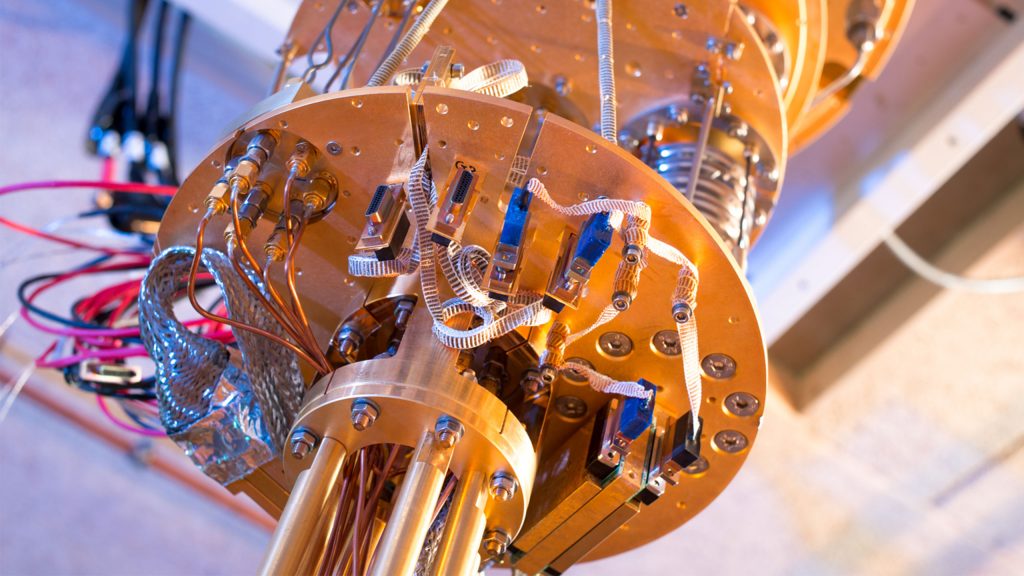The government will stimulate all kinds of research projects with billions of euros from the National Growth Fund. A large sum will be invested in quantum computer research.
The Quantum Delta NL programme will receive €615 million from the Growth Fund. (Photo: QuTech)
The Netherlands is facing a future without natural gas production. What will we then rely on for our national wealth? Knowledge, innovation and infrastructure — that’s the idea driving the National Growth Fund. The government has reserved 20 billion euros for the next five years.
The purpose of the fund is to support large, one-time expenditures that enhance the Netherlands’ future ‘earning power’. If we make a couple of bold investments, the Netherlands will be able to weather future storms — that’s the idea.
The government has asked a committee of heavyweights to review a range of applications; the results were announced last Friday. Investments in infrastructure remain to be seen, but there is good news for scientific research, and even a little bit of good news for education.
Research
A total of 646 million euros will be awarded in this first round, 525 million of it conditionally. Nearly 3.5 billion euros will be reserved “pending more detailed rationale or proven success”, as the advisory committee puts it.
Research and innovation are the big winners. An amount of 121 million euros is going directly to applications in the domains of artificial intelligence, quantum computers and regenerative medicine (using stem cell and gene therapies).
On top of that is an extra 400 million euros in ‘conditional awards’: projects will receive that money if they meet certain extra conditions. This also includes two projects for national health data and hydrogen as a sustainable source of energy. And then there is also the ‘reservation’ of 833 million euros for these five projects: funding that may be released later on.


The investment in quantum computers is particularly notable. The idea behind these computers is that, in the future, bits won’t only be 1 or 0 but can be both at the same time. It is believed that this would supply extraordinary computational power. Research in the field recently received a considerable setback when an article detailing a scientific breakthrough had to be withdrawn: the existence of so-called Majorana particles, which were said to ensure the stability of quantum computers, had not been proven. But the development of these new computers does not just depend on these particles.
The Quantum Delta NL programme will receive €615 million from the Growth Fund. The objective of the programme is to position the Netherlands as a new Silicon Valley for quantum technology in Europe in the next seven years. The programme includes the further development of the quantum computer and the quantum internet, openly accessible to end users in business and social sectors, including education.
Education
Two applications in education were only granted conditional funding. These concern 45 million euros for ‘lifelong learning’ and 80 million euros for better teaching using IT.
The project ‘lifelong learning’ concerns education at later stages of a person’s career path so that workers remain flexible and keep up with new knowledge and expertise. The applicants want to develop a digital course overview and experiment with special ‘learning recommendations’: they could receive millions for this.
The coronavirus crisis has sped up the shift to digital education, but it can surely be made better than it is now. The committee believes that a National Education Lab could help move things along, so funding will also be released for this project (under certain conditions).
Infrastructure
Actually, infrastructure won’t be getting any funding at all, not even conditionally. But this could change. An extension of the Amsterdam North-South Line to Schiphol Airport and Hoofddorp is, for example, a good idea, but requires a better plan. But other ideas ended up in the wastepaper basket. Making rivers more navigable? More connections for pipeline transport? Light rail? The committee can’t yet see exactly where the big gains would be.
The universities are happy with the outcome, according to a press release issued by the Association of Universities in the Netherlands (VSNU). “We see here the leverage effect in action, whereby public investment also attracts new private investment”, VSNU chair Pieter Duisenberg suggests.
HOP, Bas Belleman / Delta
Do you have a question or comment about this article?
redactie@hogeronderwijspersbureau.nl


Comments are closed.